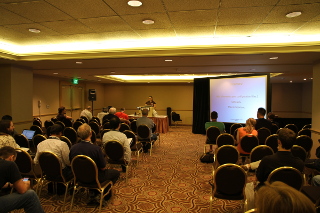In my previous post I talked about my Ubucon presentation at the Southern California Linux Expo this year and the Ubuntu booth that was busy throughout the weekend. There was much more to SCaLE12x than Ubuntu though!
On Friday I also had the opportunity to participate in the Infrastructure.Next event on Friday with a presentation on Open Source Systems Administration. This was a late addition to the schedule, and the session was only 30 minutes long so it wasn’t too much work to me to put it together quickly. As with the rest of SCaLE12x, I was happy to have a friendly, engaging audience which made for a comfortable presentation.
Slides from that talk are available here: scale_infra_opensource_sysadmin.pdf.
Friday night I enjoyed the series of UpSCALE talks, followed by the evening keyntoe by Lawrence Lessig. I saw Lessig speak over a year ago on the topic of campaign finance and government reform. I remember leaving that talk feeling a bit sad and hopeless about the situation with our government here in the US. This talk was in the same vein, but he had more positive news for actionable things that people (particularly tech people) could do to help. He also was able to showcase NHRebellion.org and the walk they did in January to gain support for their campaign finance reform efforts. The talk still made me a bit sad, because things are such a mess, but it is an important topic and I am inspired by seeing him to come the conference to speak about it.
Other highlights of the conference included a talk by Dmitri Zimine on OpenStack vs. VMWare. Predictably, as we were at an open source conference, OpenStack tended to come out on top for a long term investment of a large deployment. Of particular focus was the open source nature of OpenStack, allowing fixes to be deployed as quickly as you can patch them. The case was made for admin UIs that were easy to use in VMWare, but his message tended to be that for large deployments the administrators really should be leveraging APIs and mechanisms of automation through scripts rather than relying upon APIs. Expectedly, he urged technologists to embrace this and improve their skill set in this direction in order to remain successful and competitive in this growing market.
It was also interesting to hear from Jason Hibbets in his talk Open Source ALL the cities where he recounted his significant experience with government in Raleigh, North Carolina and the book he wrote to help other communities, with resources at theopensourcecity.com. A copy of his book now resides on my Nook (which I did buy from bn.com to support it) and I’m looking forward to learning more, it was inspiring to hear of such grassroots efforts in the technology sphere make a serious difference in local policy and quality of life.
I had a third talk at the conference that landed on Saturday evening on Code Review for Systems Administrators. The time slot was pretty packed with cool talks, so as I saw people trickle in to fill the room I was really pleased. The audience was engaging and I was able to answer some really interesting questions, which spilled over into discussions on Sunday as well. I really love the work I do so it was exciting to talk with others who share my unusual passion for process in this sphere.
Slides available here: http://docs.openstack.org/infra/publications/2014-scale12x-sysadmin-codereview/
On Sunday I was able to attend my colleague Clint Byrum’s talk OpenStack, Deploy thyself – TripleO. I’m already quite familiar with the project, but stepping back and getting a higher level view of it, along with a clearer picture of ideas moving forward is always a fun experience.
From there I headed over to the CentOS Project Q&A Forum. Given the recent rumblings in the Ubuntu community about licensing and trademarks around derivatives such as Linux Mint (which doesn’t go the extra step that CentOS does with the recompiling of binaries and avoiding trademark issues), I thought this would be a good opportunity to learn more about the direction Red Hat is taking. It was interesting to learn that this new collaboration that CentOS will begin to develop communities focused on different respins of the OS, which reminded me of the community-maintained flavors that have always been a part of the Ubuntu family. It seems that Red Hat and CentOS are moving closer to what Ubuntu has traditionally done and Ubuntu and Canonical are finally picking up some of the licensing and trademark slack that they’ve allowed with derivatives. I hope both companies and communities find a happy balance here, and as a Xubuntu contributor am certainly a big fan of flavors and respins that operate within the same community as their parent or source distribution. I find it strengthens the trust community-wide from users to developers, leads to higher quality products and makes for a healthy working relationship.
At the end of the day I had the opportunity to meet with Goran Hainer, a volunteer from the Brooks & Brooks Foundation about his work putting Linux-based desktops into disadvantaged spaces in Los Angeles. He had heard of my work with Partimus and was keen to learn from our experience in schools in the San Francisco bay area. Fortuitously, we also happened to be sitting next to someone else who was active in the space, but with a focus on providing high speed internet access to those in need. There was much swapping of success stories, challenges and business cards. I tend to be pretty shy at conferences, but when I’m able, this kind of amazing discussion is what makes an experience at SCaLE complete.
More photos from the event are here: http://www.flickr.com/photos/pleia2/sets/72157641493306483/





